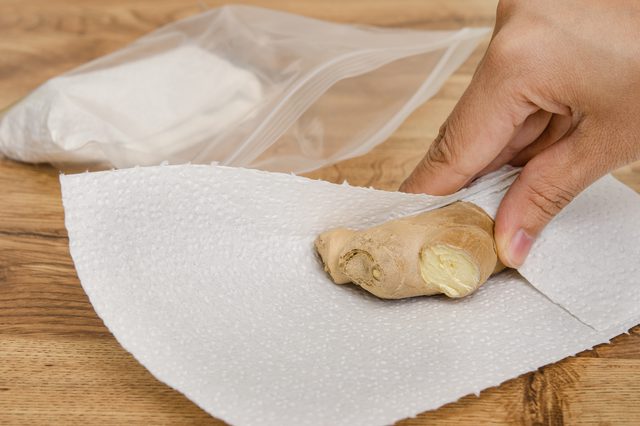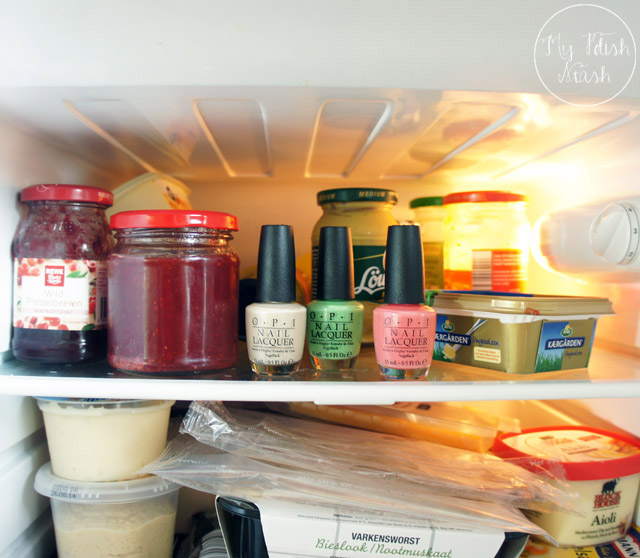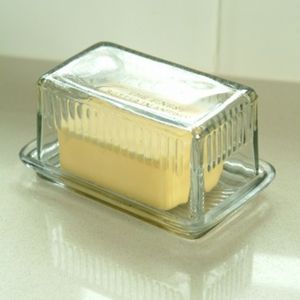Some Things Need Refrigerating, but Butter’s Not One of ‘Em!

There are some things that just need refrigerating: milk, bacon, mayonnaise, and fresh ginger (it will last up to three weeks if kept unpeeled, wrapped in a paper towel, and in a zipper bag in the crisper drawer of your fridge). Burrito or soft taco wraps also do well (and last much longer) in the fridge.
Then there’s the avocado. Many people only think to leave their avocados in the fridge if they're cut in half. But, you should actually be storing your whole avocados in the fridge as well. It can keep them fresh for up to two weeks. To keep half of an avocado fresh for longer, keep the pit in it and sprinkle it with lemon juice before storing.

While this is (mostly) a food related theme, I should mention there are a few non-food items that do better in the fridge as well, such as nail polish. The cold air maintains its colors and consistency for longer. And don’t forget your fresh flowers. They’ll keep fresher longer by storing them in your fridge overnight. The cold will prevent your buds from wilting.
But now let’s get out of the fridge. There are some things that don’t need refrigeration, and actually do their job better if not refrigerated.
Butter for instance. While it can make even the blandest piece of toast taste good, when you cut some from a rock hard stick, it isn’t easy to spread and can end up ruining your breakfast.
Maybe you’re thinking, “Butter is dairy, there’s no way I can leave it out on the counter.” Oh yes you can. So says the USDA. Their years of research has led them to listing butter as the only dairy food that is safe to keep in a power outage, as a matter of fact.

I know, you’d never keep milk out on the counter, so what makes it OK to keep butter out? They’re actually made very differently and that makes butter much less likely to attract bacteria. Butter is about 80 percent fat, which makes its water content much lower and therefore less likely to develop or host bacteria when left out. Butter is also often made with pasteurized milk, which makes it less prone to bacterial growth.
The salt in your butter also wards off bacteria growth. Researchers do say that if you have unsalted butter, though, it’s best kept in the fridge. Nah, I don’t know about that. We go through unsalted butter so quickly at our house that I can’t imagine it has any time to develop anything awry. But I’m passing on the news.

Anyway, if your butter is kept in an airtight container, or on a butter tray with a top, it will stay good for about a week. They key is to not expose it to oxygen or light. Only leave a small amount of butter out at a time so you don’t have to throw away what you don’t use after a week.
So, there you have it, you don’t need to refrigerate butter. You can say goodbye to dented bagels and mangled toast from trying to spread cold butter on them. Now your breakfast can be made in a flash.

In closing, and as a “thank you” for reading through all this blather, here’s a favorite tip: Increase your amount of butter while cutting its calories in half by blending in 1 cup of very cold water. Start with one pound of room temperature butter. Place one cube in a mixing bowl and slowly drizzle in cold water as you blend with a hand mixer. Continue this until all cubes and water are blended together. This leaves you with soft, whipped butter. You can add a smidge of salt if you like. While it’s perfect for toast, bagels, muffins, pancakes, etc., you won’t be able to bake with this.
- www.livestrong.com
- www.mypolishstash.com
- www.blogs.rsc.org
- www.notonthehighstreet.com
- www.seriouseats.com
 Alice Osborne
Alice Osborne
Weekly Newsletter Contributor since 2006
Email the author! alice@dvo.com
